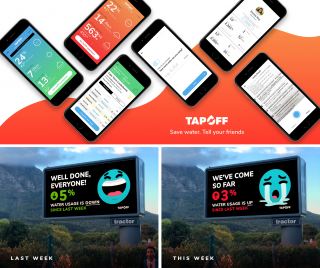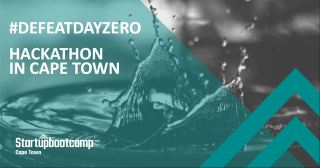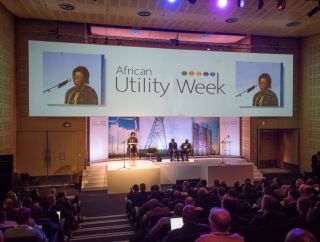TapOff: informing, motivating, and gamifying water saving
Released by AUX Studio in January, TapOff is a free mobile app that not only provides Capetonians with real-time updates on the city’s water consumption, but inspires them to make positive changes that will have a lasting impact.
While Cape Town’s ongoing drought will certainly break at some point – and with it, the current watercrisis – it’s equally certain that the amount of water available will decrease over the long term. This means residents must permanently change their water-saving behaviour.
“Information alone doesn’t drive behavioural change,” says Trevor Swart of AUX. “The key is to summarise and frame it in a way that’s meaningful for the individual.” Besides displaying the city’s overall consumption for the week, TapOff enables residents to log their own water usage and compare it with the maximum amount prescribed by city authorities. In this way, individuals see how their efforts can make areal difference to a community-wide issue.
The app goes even further to encourage participation, gamifying water-saving with suburb leaderboards where residents can display their consumption figures. “The response has been great so far,” says Trevor, “with growing numbers of users posting their water usage to neighbourhood leaderboards on a monthly basis.”
AUX has also produced a public API that delivers Cape Town’s latest water statistics. This has opened up opportunities to drive awareness beyond the mobile app. “In partnership with Tractor Outdoor, we’ve created digital billboards to make a clear emotional connection with the viewer about Cape Town’s overall water consumption, putting the city’s progress quite literally front and centre. It’s also a friendly reminder to keep up water-saving efforts – whether you’ve downloaded TapOff or not.”
TapOff has featured in both the Play Store and the App Store as a top app in the Free Education category. AUX is currently looking for more partners and sponsors so that they can offer real rewards to water savers and engage hundreds of thousands of residents.
Download the TapOff app at http://www.tapoff.co.za
Contact AUX Studio at www.aux.co.za
TapOff has been featured on the following websites:
MEMEBURN: https://memeburn.com/2018/01/tapoff-cape-town-water-app/
FINANCIAL MAIL: https://www.businesslive.co.za/fm/fm-fox/gimme/2018-03-01-gimme-every-single-drop/
WHAT’S ON IN CT: https://www.whatsonincapetown.com/post/waterwise-initiatives-capetonians/
ORIGINAL PRESS RELEASE:
Gamification app summarizes the latest water crisis stats for Cape Town
Last year in March AUX conceptualized and built the TapOff app – an experiment to inspire people of Cape Town to save water. They wanted to make it easy for residents to have access to the latest and most important information, but also to promote the idea of per-person-per-day usage by household. At the time this information wasn't readily available. They also wanted to test a simple gamification idea to see if it would inspire people to take action and share ideas.
“At the time (March 2017) we felt like the drought and cape town water crisis was a great real-world problem to tackle. It seemed like a rewarding and worthy problem to tackle with real social impact.”
Client work got in the way during the course of 2017 and the project was put on ice. Then, in November 2017, the studio decided it was still a worthwhile project and completed the first version. We officially trickled the link to social media on the 27th January. Since then the app has been featured on Memeburn.com and has also been highlighted in both the Google PlayStore and the AppStore as a top app in the Free Education category last week.
At the moment, only residents with CoCT billls can calculate their per-person-per-day usage using the app calculator, and then post that result to their suburb leaderboard. Some people have rightly pointed out that this excludes residents without a water bill. The developers provided the following response to users in the app store:
“You've raised a great point here which we need to consider. We decided to release the product before it contained all the possible features we could build, otherwise we might never have launched at all, and we didn’t want that. We realise there are things that we have not conquered but we will get there as we gather feedback like this, learn and adapt. Plans to capture water usage in a different way are already underway.”
So far, the response has been great, and there are already hundreds of users who have posted their water use to the Cape Town leaderboard. Last week an update was released so that users per-person-per-day calculation is more visible and people can also navigate to their suburb. All users are created anonymously using a unique and creative naming system.
AUX is a product design studio based in Cape Town. They work with established businesses and start-ups providing naming, identity design, ux design and rapid-prototyping.
Link to the TAPOFF app http://www.tapoff.co.za
#DEFEATDAYZERO Hackathon in Cape Town
Startupbootcamp (SBC) Cape Town and RCS Group have announced a water-saving hackathon to be held on 9 and 10 February to commission technology from the wider Cape community in a bid to push back Day Zero.
The H2O (Hack Two Day Zero) event will host executives from Old Mutual, Nedbank, RCS, Woolworths Financial Services and PwC to engage with entrepreneurs, students, concerned citizens and local government.
“We are in the midst of a water crisis in the Western Cape and with the implications of Day Zero fast approaching there will be wide-spread impacts. The onus is not only on the individual to conserve water, but as corporates we have a responsibility to collectively apply our minds to this challenge facing the society which we operate in. Hosting a Hackathon purely focusing on the water crisis was the perfect opportunity for RCS to show both support and desire to address this issue. At RCS we pride ourselves on being at the forefront of innovation and we believe in the agility of tech startups to make a difference. It is therefore our ambition that the event may lead to finding valuable and feasible solutions for both companies and individuals,” states Regan Adams, CEO of the RCS Group.
Hackathon participants will have two days to pitch their ideas, form teams and create prototypes under the guidance of corporate sponsors.By holding events in more than 100 cities each year, SBC supports the world’s most talented founders with hands-on mentorship and access to key industry connections. SBC is known for growing and scaling innovative solutions to modern challenges within the African continent. The cohort strives to solve pertinent issues such as the water crisis by embracing new technology and ideas.
“By creating an environment to collectively pool ideas together, we believe this hackathon can ensure that both short term and long-term solutions can be designed to deal with the crisis. We encourage everyone who has a desire to make an impact to join. By bringing ideas and skills together, we can make a difference,” said Paul Nel, Chief Partnership Officer and CFO of Startupbootcamp Cape Town.
The current dam levels for Cape Town are 26.5%. If dam levels continue to drop, day zero could be a reality by 12 April.When Cape Town dam levels drop to 13.5%, the city will begin to shut down its reticulation system in residential areas.If you or anyone you know has a tech-based idea or solution to solve the problems the water crisis is causing, this hackathon may help you get your prototype produced.
“For the winning team, there will be a cash prize, with an added incentive of building the solutions designed if they are believed they will make the impact we envision,” states Paul Nel.
If you are interested in participating in the event, please sign up here.
RCS will open their corporate offices in Golf Park to host the event which will be managed and coordinated by the SBC Cape Town team.
About Startupbootcamp
Startupbootcamp is a global network of industry focused startup accelerators currently running 21 programs in Amsterdam, Barcelona, Berlin, Cape Town, Chengdu, Copenhagen, Dubai, Istanbul, London, Melbourne, Mexico City, Miami, Mumbai, New York, Rome, and Singapore. The cohort has a track record of generating innovative solutions for Smart Cities.
About RCS Group
The RCS Group (RCS) is a leading consumer finance business that offers its customers a range of financial service products under their own brand name, in association with a number of leading retailers in South Africa, Namibia and Botswana. RCS collaborates with its retail partners as BNP Paribas Personal Finance South Africa.
INFORMATION:
Dates and Times:
- 9 February 15:00 – 18:00
- 10 February 08:00 – 18:30
Venue: RCS Group Head Office opposite Mowbray Golf Club, 1 Raapenburg Road, Cape Town, 7700
For more information on the Hackathon, to sign up or if you have any additional queries, please contact:
Nsovo: This email address is being protected from spambots. You need JavaScript enabled to view it.
Mo: This email address is being protected from spambots. You need JavaScript enabled to view it.
-- Ends --
For more information about this press release, please contact:
Mika Stanvliet | This email address is being protected from spambots. You need JavaScript enabled to view it. | 081 534 6237
HDPE-Pipes help Drakenstein Municipality become pioneers in Water-Loss Reduction
Water leakage and non-revenue water have become two of the biggest problems facing municipalities around South Africa in recent years. Under the leadership of André Kowalewski, Senior Engineer: Water Services, and in line with their vision of being a “City of Excellence” the Drakenstein Local Municipality in Paarl, Western Cape, began a 20-year master plan to replace old or aging asbestos pipes with HDPE pipes, thereby allowing them to achieve significant successes in reducing water loss throughout the municipal area.
Background to the problem
Ever-increasing water losses in the Drakenstein Municipality were surpassing demand growth. By 1999, the water losses stood at 34% and were increasing, thereby forcing them to investigate the reasons for the high water losses and find ways to mitigate these on a broader front.
The municipality began prioritising projects that included pipe replacements, the replacement of bulk and domestic water meters, pressure management, leak detection and repair, public awareness and upgrading information and management tools. Reaction time to attend to burst pipes was also reduced to less than one hour. These initiatives have brought water losses down to an average of 16% – and 11% at its lowest.
The lower losses enabled the municipality to delay the construction of reservoirs and large pipelines for several years. There was also a decrease in the occurrence of burst pipes. However, the reduction in residual pressures in various pressure zones had the biggest water saving effect.
Replacing aging pipes with HDPE Pipes
The municipality has placed significant emphasis on replacing 14.2 km of old asbestos pipes with new HDPE pipes, at a value of R120 million.
“Prior to embarking on the project, we carefully compared steel pipes with HDPE pipes. We were fully convinced that the latter offered us significant more advantages and impressive cost saving benefits. Taking the life cycle of the HDPE pipe as a material into account, it surpasses most other pipe materials. The pipes can also handle the fluctuation in water pressure and flow characteristics within the pipe design limits better than any other flexible pipe systems. If correctly designed, and with proper installation, an HDPE system – together with the fittings – will provide the lowest maintenance compared to any other pipe material system,” Kowalewski explains.He adds that the most attractive advantage of HDPE is a pipe system without pipe joints. “We no longer have the issue of corrosion, failing joints or costly maintenance issues due to downtime, as most of the fittings used in HDPE systems are moulded out of polyethylene material.
Other fittings used by the municipality include flanges and tee-pieces predominately manufactured using grade 316 stainless steel.
“The philosophy behind the use of a high-grade material is to have a total system where the pipe material and fittings, when used together, will guarantee a useful operating life that surpasses 50 years. It means that the chemical resistance and durability of the fittings must be the same as those of the pipes,” states Kowalewski.
Tests and calculations done on HDPE have shown that the pipe material’s useful lifespan runs up to 100 years. In addition to this, HDPE is the most popular pipe material to use when replacing pipes using trenchless construction methods, and downtime due to repairs on pipes is no longer an issue.
Insisting on SAPPMA and IFPA certification
“Workmanship is very important when it comes to the manufacturing of HDPE pipes,” Kowalewski says. He explains that they’ve had incidents in the past where pipes not bearing a mark of quality fails soon after installation.
“It is almost impossible to identify whether or not a pipe is of inferior quality prior to installation and purely based on appearances. However, we have learned through trial and error and the school of hard knocks that unless a pipe bears a SAPPMA mark, it will not meet the quality standards of certification bodies such as the SABS or SATAS.”
“For this reason, we have changed our tender specifications by insisting that all suppliers of HDPE pipes are members of SAPPMA, and that all welders and installers of the pipelines are IFPA certified. When we see the SAPPMA mark on the pipes of the IFPA stamp on the welds, we know that the pipeline will stand the test of time and that we have recourse if it fails to deliver,” he concludes.
For more information, visit www.sappma.co.za
Sources
André Kowalewski
Senior Engineer:
Water Services, the Drakenstein Local Municipality,
Paarl Western Cape (www.drakenstsein.gov.za)
Danielle Petterson, 3S Media (www.3smedia.co.za)
Cape Town’s water restrictions – restricting or a necessary, new way of life?
“Drought has exposed the poor, or lack of, water management”
“The drought that has impacted many regions within South Africa for a considerable length of time now has exposed the poor, or lack of, water management (monitoring and control) ability of many water institutions, as well as the difficulties and inability of municipalities and their consumers to be able to reduce their consumption when required” says Steve Gillham, General Manager: Engineering and Scientific Services, Umgeni Water and advisory board member of African Utility Week, the leading annual conference and exhibition with a strong focus on water management, taking place in Cape Town in May.
He adds: “there are many hard lessons being learnt by the affected water institutions that need to be shared and documented to improve the response for future drought events. Responses have come from national, provincial, water boards and municipalities to dry to address the situation. Certain initiatives have been more effective than others”.
Water becoming scarce commodity
It may come as a surprise to some that globally South Africa is classified as a water-stressed country, with annual rainfall of about 492 millimetres compared to other areas with around 985 millimetres. The Western Cape is in a situation where the threat of water shedding is looming and currently on high alert with level 3B water restrictions.
“This vital resource needs our help!“ says Nicolette Pombo-van Zyl, editor of ESI-Africa, a leading power and water trade publication and session chair at African Utility Week, “and considering that water is increasingly becoming a scarce commodity, time has come for us to become extra mindful of our water usage as a way of life going forward, even after the restrictions are lifted in the future.” She explains: “the question to ask yourself is what your household and company are using potable water resources on. We were in a similar situation with electricity load shedding and rallied around backup generators, energy efficient light bulbs and switching off equipment in standby mode.”
Let us not fall back into old habits”
“The same applies to water” Nicolette adds, “the solutions are endless and people are coming up with innovative ways to manage their water usage more effectively, such as attaching extension pipes to outlets to run grey water straight into the garden. Incidentally, research has shown that gardens, toilets, baths and showers use the most water. So concentrate on managing these areas. Consider putting a layer of mulch around trees and plants to slow evaporation, choose water wise plants, opt for a rock garden instead or find alternatives such as artificial grass.”
ESI Africa’s editor says: “Around the house fix dripping taps, do not let the water run whilst brushing your teeth or washing your hands. Try a ‘dry’ shower by turning off taps whilst soaping up – be bold, inventive and imagine a life without water as your inspiration.”
She adds: “it is also very inspiring to hear about big apartment blocks in the city that have organised to give all the residents a big 10 litre bucket each to collect their grey water which is then used to water the gardens and used to clean the building and outside facilities.” “Let’s use our social media (neighbourhood Facebook and Whatsapp groups) to help each other manage this precious resource more efficiently. And most importantly, when the rain does come, let us not fall back into old habits. And let’s not forget that South Africa is celebrating the annual National Water Week next month from 16-19 March to raise awareness while World Water Day takes place on 22 March.”
Managing water services better
“Drinking water and wastewater utilities in Africa are struggling to cope with the increasing demand for services, especially in rapidly growing urban areas” says Evan Schiff, event director of African Utility Week. He continues: “responding adequately to this ever increasing demand necessitates strong and active partnerships between the private sector in particular and municipal governments”.
The water track at African Utility Week will bring together experts from public and private sectors to support utilities and municipalities become more responsive and efficient in their practices.
Leading water and energy platform
African Utility Week takes place from 16-18 May 2017 at the CTICC in Cape Town, gathering over 7000 decision makers in the power and water sectors from more than 40 countries to source the latest solutions and meet over 300 suppliers. The expo will feature free to attend technical workshops and technology demonstrations.
KPMG is diamond sponsor Already leading global advisory firm KPMG has confirmed that it is returning to African Utility Week, this time as its exclusive diamond sponsorship. Other long-running supporters and industry stalwarts EPG, Landis+Gyr, Ontec and Shell are also back as platinum sponsors while Conlog, Oracle and Vodacom are gold sponsors again.
Part of the event is Energy Revolution Africa, a new platform for community scale projects, which will provide a unique forum for solution providers to meet with the new energy purchasers such as metros and municipalities, IPPs, rural electrification project developers and large power users, including mines, commercial property developers and industrial manufacturers.
African Utility Week and Energy Revolution Africa are organised by Spintelligent, a multi-award-winning exhibition and conference producer across the continent in the infrastructure, real estate, energy, mining, agriculture and education sectors. Other well-known events by Spintelligent include Agritech Expo Tanzania, CBM-TEC, Kenya Mining Forum, Future Energy East Africa (formerly EAPIC), Future Energy Nigeria (formerly WAPIC), Future Energy Central Africa (formerly iPAD Cameroon), iPAD Nigeria Mining Forum, DRC Mining Week and EduWeek. Spintelligent is part of the UK-based Clarion Events Group.
Dates for African Utility Week and Energy Revolution Africa:
Conference and expo: 16-18 May 2017
Awards gala dinner: 17 May 2016
Site visits: 19 May 2016
Location: CTICC, Cape Town, South Africa
Websites: http://www.african-utility-week.com
Twitter: https://twitter.com/AfricaUtilities
Linkedin: African Power Forum
Contact: Senior communications manager: Annemarie Roodbol
Telephone: +27 21 700 3558
Mobile: +27 82 562 7844
Email: This email address is being protected from spambots. You need JavaScript enabled to view it.






